Key takeaways:
- Networking is about building genuine relationships and contributing to a community, not just exchanging business cards.
- Successful networking relies on meaningful conversations and maintaining connections through follow-ups and tailored communication.
- Vulnerability and active listening are vital for fostering deeper connections during networking interactions.
- Setbacks in networking should be viewed as learning opportunities, prompting reflection and growth to enhance future engagements.
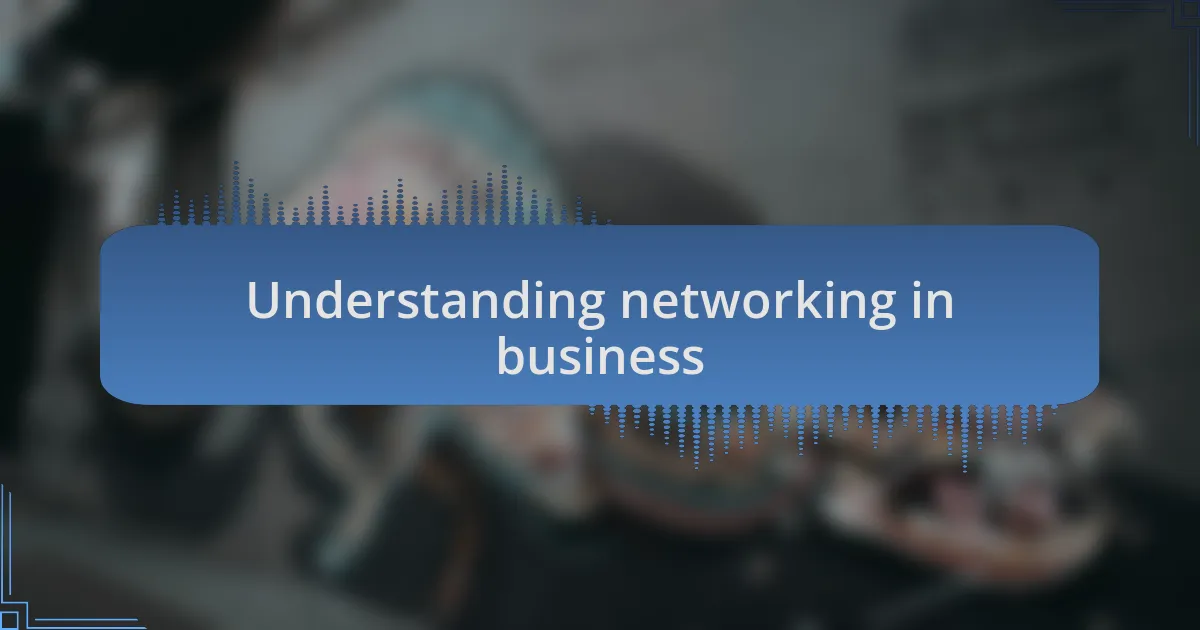
Understanding networking in business
Networking in business is more than just exchanging business cards; it’s about building genuine relationships. I remember attending a networking event where I felt completely out of my element. Instead of forcing small talk, I decided to focus on listening, which opened up deeper conversations and more meaningful connections than I expected.
When I think about the importance of networking, I reflect on the times I hastily rushed through interactions. Have you ever left a networking event feeling like you didn’t make a single real connection? It’s a sinking feeling that underscores how crucial it is to approach networking with authenticity. I learned that every interaction is an opportunity to uncover shared interests or potential collaborations.
Ultimately, networking is not just about selling yourself; it’s about contributing to a community. Once, I helped someone with their project because I genuinely wanted to see them succeed, and that act of generosity led to unexpected opportunities for me down the line. It’s fascinating how generosity in networking can come back around, enriching your own business journey in unexpected ways.
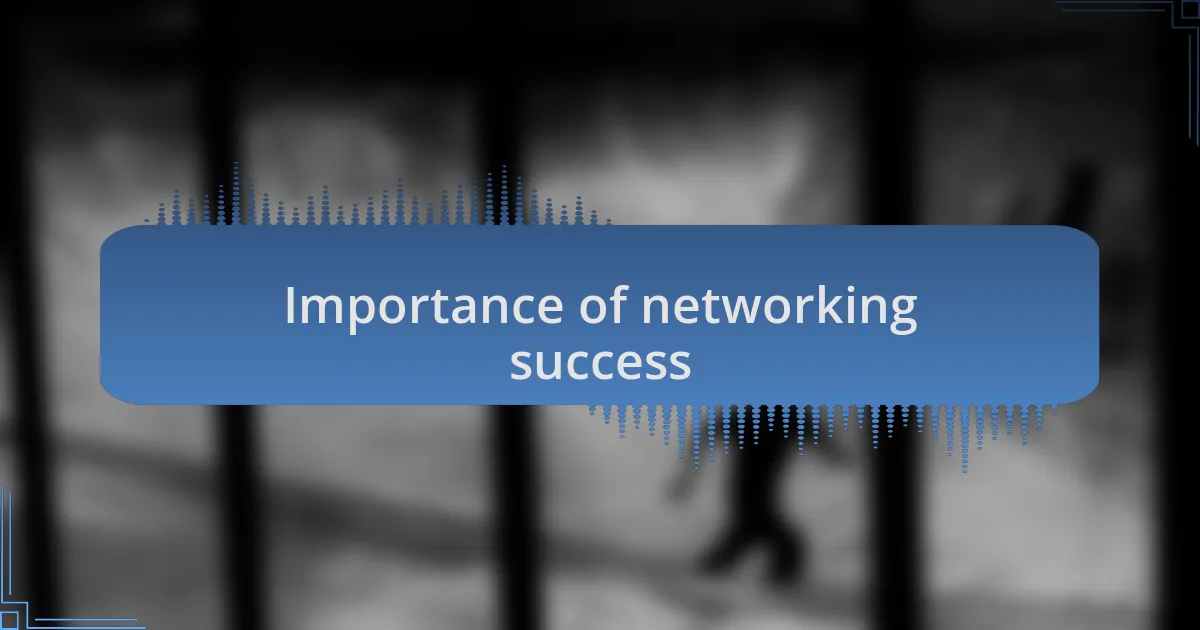
Importance of networking success
When I look at the successes I’ve had in my career, networking stands out as a key factor. In one memorable instance, a casual coffee chat led to potential collaborations that would have never surfaced in a more formal setting. It makes me wonder: how often do we underestimate the power of a single conversation?
Building a solid network forms a safety net during tough times. I can recall a period when a client unexpectedly canceled a project. Instead of panicking, I reached out to a fellow entrepreneur, and within days, we brainstormed a new initiative together. That connection not only saved my month but sparked a partnership that continues to thrive. It’s a reminder of how our networks can be our lifelines.
Successful networking creates a ripple effect, enriching everyone involved. Think about it—when you support someone in their journey, you’re not just being kind; you’re investing in a community that might one day lift you up. I truly believe that when you approach networking with a mindset of giving, the returns can be more substantial than you could ever predict.
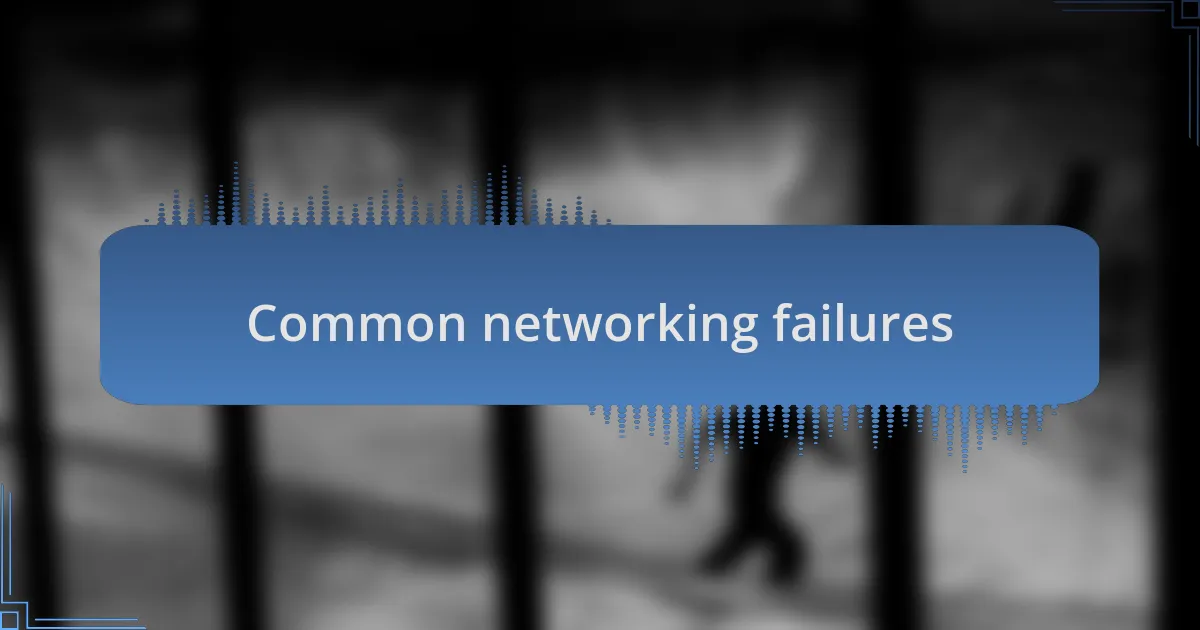
Common networking failures
Networking failures often stem from a lack of genuine connection. I remember attending an event where I handed out my business cards like confetti, believing the volume would equate to value. But as I walked away, I realized that without meaningful conversations, those cards were just pieces of paper. How many times do we confuse quantity with quality?
Another common pitfall is not following up after initial meetings. I once met someone who seemed like a perfect match for a project I was developing. I got swept up in the moment and didn’t reach out afterward. Days turned into weeks, and eventually, that opportunity slipped through my fingers. It’s amazing how quickly a promising lead can fade if we don’t nurture it right away.
Lastly, some professionals fail to tailor their approach to different audiences. I encountered this when I mistakenly used industry jargon with someone who wasn’t familiar with our field. The look of confusion on their face was a clear signal that I wasn’t connecting. This experience taught me that effective networking is about adapting communication to meet the listener where they are. How can we expect to build relationships if we can’t speak the same language?
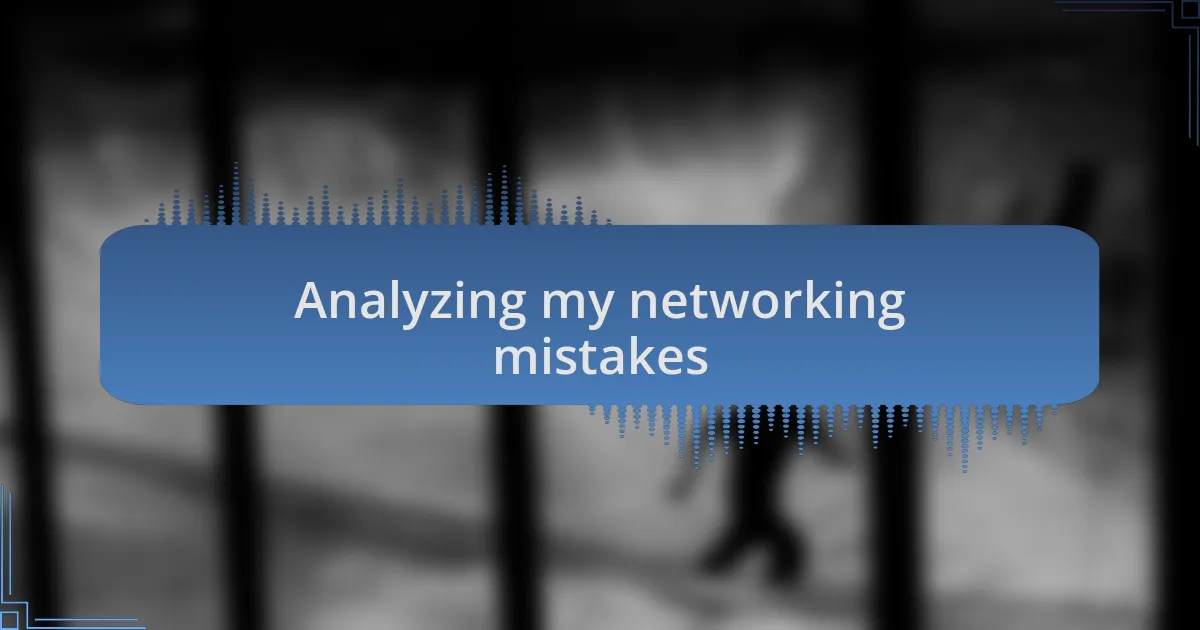
Analyzing my networking mistakes
Reflecting on my networking journey, I’ve come to understand that being overly assertive can often backfire. At a recent workshop, I cornered a speaker right after their presentation, bombarding them with questions in what I thought was enthusiasm. The look of annoyance on their face taught me that there’s a fine line between eagerness and overwhelming someone. How can we truly connect if our approach feels more like an interrogation than a conversation?
One glaring mistake I made was ignoring the value of active listening. I vividly recall a coffee chat with a potential collaborator; instead of genuinely absorbing their insights, I was too focused on formulating my own responses. By the end of our conversation, I realized I had missed critical points they were trying to express. It hits hard to acknowledge that in our quest to impress, we might sideline others’ voices. Isn’t real connection built on understanding each other?
Another vital lesson emerged from my tendency to keep my personal stories to myself. I remember attending a networking gathering where everyone shared anecdotes that reflected not only their professional journey but their personalities too. I hesitated, thinking it wasn’t the right moment to share my own experiences. When I finally spoke up, it became clear how much more relatable and engaging our interactions could be if we let our guard down. What good is networking if it’s devoid of authenticity?
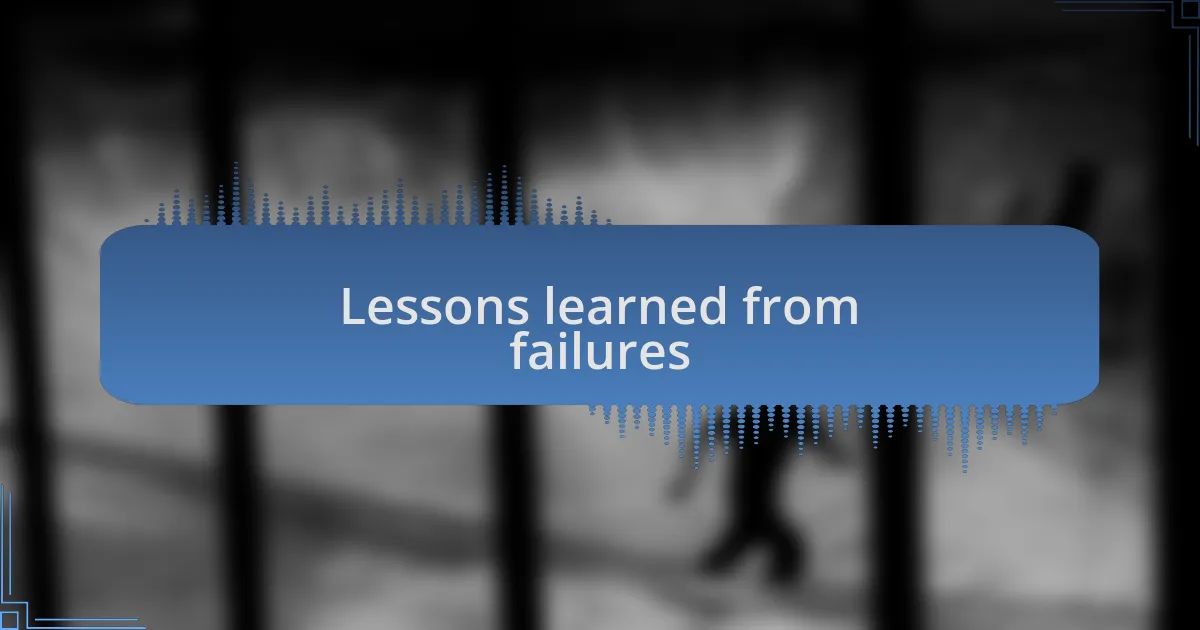
Lessons learned from failures
Mistakes in networking often reveal deeper insights about ourselves and our approach. For instance, I recall a time when I shied away from following up after what I thought was a promising initial conversation. I convinced myself that a delay seemed strategic, but the silence only highlighted my lack of commitment. Through that experience, I learned the importance of maintaining momentum in relationships. Is it ever too soon to reach out again?
Another powerful lesson for me was understanding the impact of vulnerability. I once met someone who shared a significant challenge they had faced in their career. Instead of quickly shifting the conversation back to myself, I embraced the moment of honesty. This openness not only deepened our connection but also encouraged others in the room to share their struggles. Isn’t it amazing how vulnerability can pave the way for stronger relationships?
I also discovered the consequences of neglecting body language. There was an event where I was preoccupied with the thoughts racing through my mind. I wasn’t aware that my crossed arms and distracted gaze could send a message of disinterest. Reflecting on that interaction made me realize that energy and approachability matter profoundly. How many opportunities slipped by because I didn’t show my interest through simple gestures?
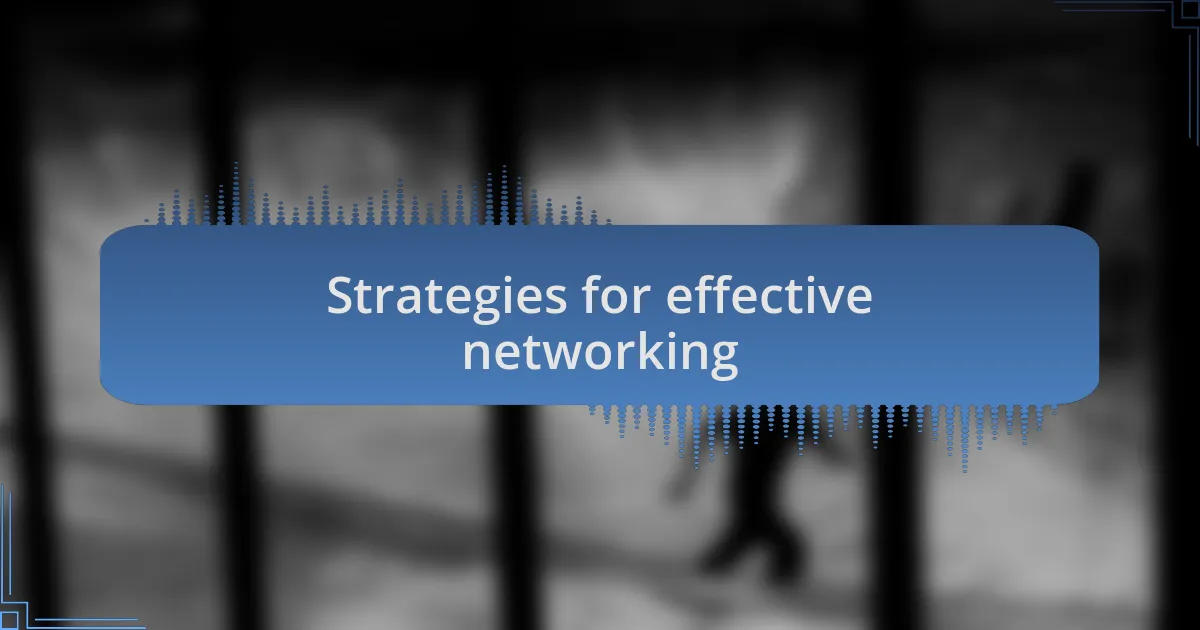
Strategies for effective networking
Building genuine connections starts with being truly present. I recall attending a workshop where I spent too much time scrolling through my phone rather than engaging with the people around me. The awkwardness left me feeling isolated, and I realized that being physically present isn’t enough. Have you ever felt the distance created by an unshared moment? It drives home the point that active listening and engaging eye contact can transform a lackluster networking attempt into a meaningful exchange.
Another strategy I’ve found effective involves being intentional with my follow-ups. After a networking event, I once sent a generic thank-you email to several contacts. It wasn’t until a friend pointed out the lack of personalization that I understood how much more impactful a tailored message could be. When I began referencing specific details from our conversations, the responses were overwhelmingly positive. Isn’t it incredible how a little effort can make someone feel valued and remembered?
Lastly, embracing a mindset of curiosity has dramatically changed how I approach networking. Instead of focusing solely on what I can gain, I ask questions that spark deeper conversations. At one event, I asked a fellow attendee about their biggest inspiration, which led not only to a great discussion but also to valuable insights for my own journey. Have you considered how curiosity might unlock richer interactions in your networking experiences? It’s a small shift that can yield substantial rewards.
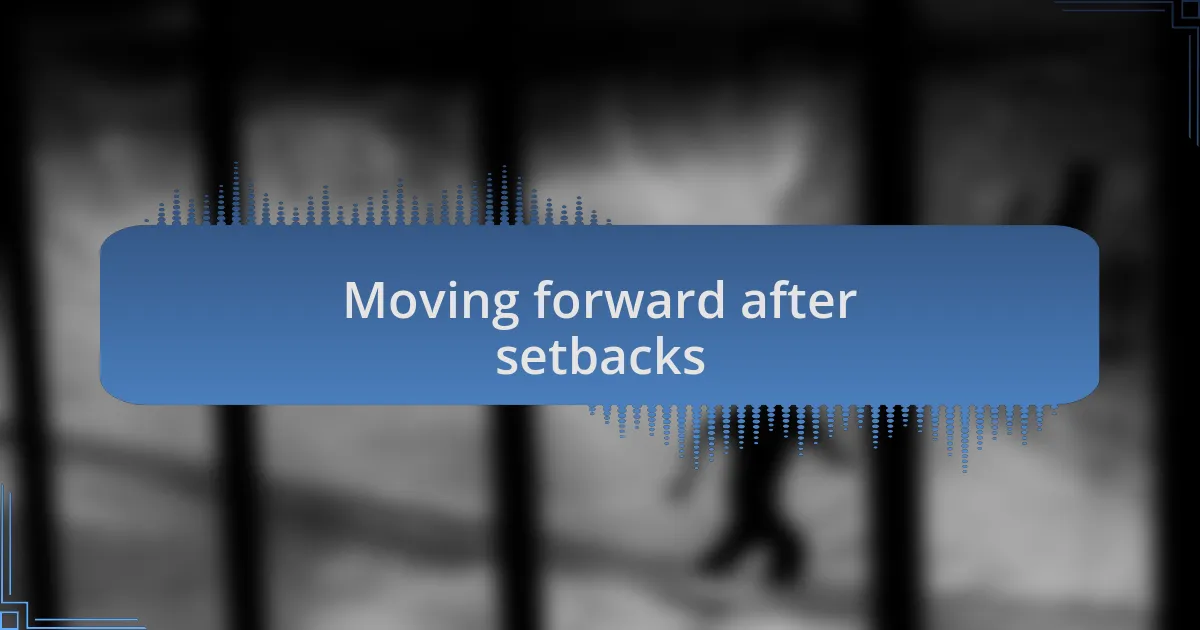
Moving forward after setbacks
After facing setbacks in networking, I had to remind myself that failure isn’t the end, but rather a part of the journey. For instance, after a particularly awkward event where no connections were made, I took a step back to analyze what went wrong. I realized that dwelling on that one experience only clouds our potential for future engagements. How often do we let one setback dictate our confidence?
I learned to pivot my focus towards growth and resilience. After an unsuccessful follow-up with a key contact, I decided instead to view that moment as a learning opportunity. I took the time to reflect on what I could have done differently, and that reflection sparked a series of changes in my approach. Have you ever found strength in what initially felt like a failure? Turning setbacks into lessons not only fuels personal growth but also builds a more robust network moving forward.
Each setback has nudged me towards better preparation. When faced with disappointing responses, I began to immerse myself in understanding the individuals I wanted to connect with. Whether it was researching their background or understanding their interests, I found that the more effort I put into knowing them, the more meaningful our conversations became. Don’t you think that turning potential disappointments into opportunities for growth can ultimately enhance our networking success? It’s about reshaping those experiences into stepping stones rather than stumbling blocks.